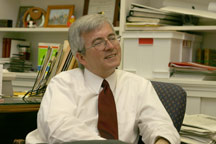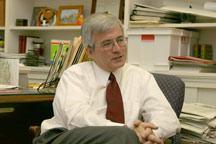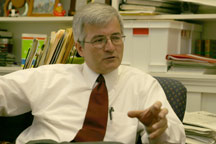Wabash’s Dean of the College Mauri A. Ditzler ’75 has been named the 13 th president of Monmouth College in Monmouth, Illinois and will begin his presidency on July 1. In between meetings with Division Chairs and Department Chairs at the end of a busy school year, we sat down with Dean Ditzler to talk about life as President Ditzler.
JA: Let’s start with your time at Wabash these last six years.
 MD: "It was a special opportunity to come back to Wabash
College after having been away 25 years. I had consciously stayed away;
I didn’t come back to reunions or football games. Part of that was
simply being a faculty member and administrator at other schools, so
when Wabash had reunions, we had reunions where I was teaching. But the
other part of it is more personal. I had such a good experience at
Wabash and I didn’t want to go back to ‘test’ the experience. You see,
faculty and administrators view a college very differently than students
do, and I didn’t want to ‘test’ my student experiences; I wanted to hold
on to this mythological view of Wabash.
MD: "It was a special opportunity to come back to Wabash
College after having been away 25 years. I had consciously stayed away;
I didn’t come back to reunions or football games. Part of that was
simply being a faculty member and administrator at other schools, so
when Wabash had reunions, we had reunions where I was teaching. But the
other part of it is more personal. I had such a good experience at
Wabash and I didn’t want to go back to ‘test’ the experience. You see,
faculty and administrators view a college very differently than students
do, and I didn’t want to ‘test’ my student experiences; I wanted to hold
on to this mythological view of Wabash.
"What was special was that the magical picture I took away from Wabash as a student in 1975 was real and it hadn’t changed. When I came back to test my memories, they held up. So these last six years have been very much like my four years as an undergraduate. Wabash is a special oasis in higher education where teaching and learning is done the way it should be."
JA: Why is it that you are attracted to Midwestern liberal arts colleges?
MD: "All colleges are special to the students who attend them. And I try hard to find something I like in every campus I visit. But there is a special place in my heart for Midwestern liberal arts colleges. They are counterintuitive. If you think about when and where they were established—on the western frontier in the 1800s—and they found it important to understand the classics, to understand science and philosophy. That doesn’t sound like the kind of education needed on the frontier in the 1800s, but it was a way of teaching and learning that has endured.
"When I was a student at Wabash, one of the things we talked about was how remarkably hard students work. Students could catch up and surpass students from other colleges with more sophisticated backgrounds. The high school I attended, for example (Rosedale), had only one math teacher. There was only one English teacher. There were students who had the same math teacher for six years; the same English teacher for five years. So I came to Wabash having written only one essay in my life. Wabash was a place where you could come with holes in your academic record and still catch up. And it still is that way today.
"That’s one of the things that attracted me to Monmouth. I asked them, ‘Do you like your students?’ And they said, ‘Yes, we do.’ Like Wabash, Monmouth is a school far more interested in who the students are when they graduate than when they started."
JA: What do you consider your hallmark achievements at Wabash?
 MD: "I was talking with a senior faculty member on Friday and
told them I was leaving. And this faculty member said to me, ‘This is a
really fun place to teach.’ That’s one thing of which I’m most proud. If
the faculty are having fun teaching, they will teach remarkably well.
MD: "I was talking with a senior faculty member on Friday and
told them I was leaving. And this faculty member said to me, ‘This is a
really fun place to teach.’ That’s one thing of which I’m most proud. If
the faculty are having fun teaching, they will teach remarkably well.
"Colleges ought to be places where faculty can express their creativity as teachers. One of the things we’ve done over the last half-dozen years is make it possible for faculty to get together and say, ‘What if we were able to take our students studying the European Union to Belgium?’ Through the efforts of a lot of people, we’ve created an environment where faculty can be creative as teachers; they can ask, ‘What if?’ and we have been able to make it happen.
"And finally, as best as I can tell, Wabash students enjoy learning and their four years on campus. I try to interview every graduating senior and I ask them what they’d change and what they’d keep the same. And every year the list of things they would change is remarkable short. I think our students enjoy their experience at Wabash because of their engagement with the faculty. Any time you can put students and faculty closely together, good things will happen."
JA: What about moving away from your small town, Parke County roots?
MD: "When I was recruited out of Rosedale High School by Steve Grissom, people said he was the first college recruiter they could ever remember coming to Rosedale. And I believe I was the first graduate of Rosedale to graduate from Wabash.
"I’ve really enjoyed reconnecting with Parke County alumni of Wabash at the annual Parke County Scholarship Dinner. It allows me to see how Wabash has had such a positive impact on small Indiana communities. We tend to focus our attention on our alumni in New York, Chicago, and Los Angeles who make a name for themselves nationally. But if you look closely, what you really see is that Wabash men become the backbone of small communities. Parke County’s leaders—the lawyers, judges, and business people—came to Wabash."
JA: Other than meeting people and getting to know the place, what’s on your agenda for Monmouth?
 MD: "One of the things I’ve learned at Wabash College is for an
institution to really thrive, everyone has to understand the mission and
core values of the institution. So, we’ll spend our time as a community
discussing the mission and core values; we’ll need to be able to
articulate those things clearly. If you have a place with a shared
understanding of its mission and core values, then you can become very
creative in teaching and learning.
MD: "One of the things I’ve learned at Wabash College is for an
institution to really thrive, everyone has to understand the mission and
core values of the institution. So, we’ll spend our time as a community
discussing the mission and core values; we’ll need to be able to
articulate those things clearly. If you have a place with a shared
understanding of its mission and core values, then you can become very
creative in teaching and learning.
"Like every college in the country, we’ll work on improving graduation rates. You do that by getting students more engaged with faculty. When students get together and engaged with faculty, they succeed. When they succeed, they graduate.
"And a significant part of my new job will be raising funds to allow faculty to achieve their teaching goals. We’ll need to raise some funds for a student center, a building for the business program, and probably down the road a science building.
"The Monmouth campus is growing in number. We’ll have to decide where to cap it. A dozen years ago enrollment had dipped to around 600; now it’s between 1200 and 1300. We’ll continue to grow, but at some point we’ll discuss how big we need to be."
JA: Care to reflect on your time at Wabash?
MD: "I love this college and the people here. I enjoy living in a small Indiana town. I’m lucky to have the Center of Inquiry in the Liberal Arts here, and we just got a grant to promote Indiana culture. All these things make being Dean at Wabash the best job in the world. And I enjoy being able to be involved in all aspects of a college. I suppose I could have been a Dean forever, but I would have missed the opportunity to put all of the pieces together for a whole that benefits students, faculty, and alumni."
JA: Why Monmouth?
MD: "I think this country needs more outstanding colleges; colleges like Williams, Amherst, Bowdoin, and Bates that don’t have to worry about attracting faculty or running out of funds. Wabash is a place like that. And Monmouth is at a place in its history where it could be seen as a stalwart amongst this country’s educational institutions. I’m intrigued by the possibility of participating in that process."
JA: Are you leaving Wabash in a good place?
MD: "Wabash was in a good place when I came here. I was fortunate to be here at a time when there was a marvelous team of faculty and administrators who had a shared sense of the mission and core values of the college. We’ve hired a remarkable number of very talented, young faculty members, so Wabash has a very bright future.